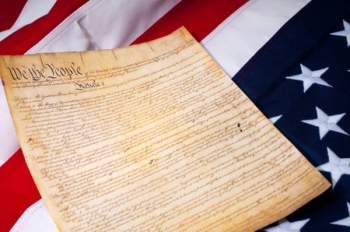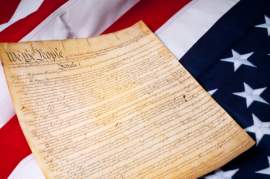
A Guide to the Preamble to the Constitution

Popular In Constitution
Purpose Of Lifetime Appointment And Pros And Cons Enumerated Powers Bicameral Legislature Background Article 3 Of The Constitution We The People 1st Amendment Who Wrote The Constitution Judicial Review Equal Protection Clause 5th Amendment 10th Amendment Three Fifths Compromise
The Preamble to the United States Constitution was written after the rest of the Constitution had already been completed in a first draft. The United States Constitution was submitted to a Style Committee, which then revised the Constitution and also added the Preamble. This Committee was headed by Governor Morris of Pennsylvania, and he is often given the credit for having written the Preamble, even though historians cannot be absolutely confident as to whether it was written by him or another man within the Style Committee.
The significance of the Preamble to the rest of the United States Constitution has remained a topic to be debated for many years. The Preamble, though very short, presents a basic set of assumptions and concepts which many interpreted as having legal force. It establishes basic intent for the Constitution, along with a basic understanding of the core ideas in the establishment of the Constitution, such as the fact that the Constitution was being ratified not by individual states, which would have been the only entities governed by the United States Constitution if they had been the ones ratifying it, but was instead being ratified by the people.
The issue of whether or not the Preamble actually bears legal significance, however, was not immediately clear. This is especially so because of the fact that many parties existing at the time of the Constitution's inception believed that the Preamble provided all the necessary information which the Bill of Rights might have provided, thereby eliminating the need for a separate Bill of Rights.
In general, at this point in American history the Preamble is considered to have no genuine legal power. It does not grant rights to citizens, nor does it grant powers to the states or to the Federal Government that are not granted elsewhere in the United States Constitution. It does, however, explain some of the motivations and intent of the United States Constitution. It furthermore explains some of the basic tenets under which the United States Constitution operates.
The Preamble provides a strong enough guide that it can influence policy in certain decisions and situations, as it can lead to an understanding of if or when certain principles should apply. A given statute, for example, would exist in law outside of the Preamble to the United States Constitution, but the exact interpretation and implementation of that statute could be influenced by the nature and language of the Preamble.
This means that many elements of the Preamble to the United States Constitution have been dissected and re-examined and dissected again over the years, as many have argued about exactly the way in which the Preamble should be interpreted. For example, understanding exactly what is meant when the phrase "People of the United States" is used is important to understanding the rest of the Constitution and how it should be interpreted.
The understanding of the United States mentioned in the Preamble, for example, has been taken to mean parts of the world that are under the control and domain of the United States, but may not actually be part of the Union. Similarly, understanding the meaning of "We the People" bears great significance. So while the Preamble to the United States Constitution may not have any inherent legal power, it is highly important for understanding the Constitution as a whole and how it comes into play in any given situation.



















